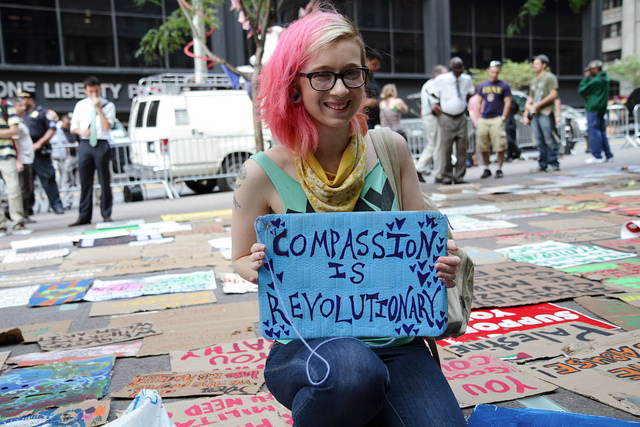
I recently got into an argument with someone.
I have not heard harsh words like the ones that were hurled at me in quite a long time, and it was extremely tough for me to handle. These were the sort of words that, at the time, not only cut me open in new places, but also felt as if they were reopening old wounds that go back decades.
Despite my attempts to infuse some love into those moments—both for this other person and for myself—it was not effective.
This person seemed spun out and pulled under by the currents of something rather dark.
It took me a couple of days to recover emotionally, mentally and even energetically from what had happened. I needed space, I needed to process and I needed to not get drawn into the false truths about what was said.
I needed to center myself and not allow myself to slip into a victim mode.
This happens more frequently than it should, no?
We hurt each other at times, and, admittedly, I have done this to others as well. I think that we all do—after all, we are human.
It is in the moments both during and after these situations that we have a choice.
The choice lies in our option to see these people for who they really are, and not who they are when pain and fear have taken over their thoughts, words and maybe even actions.
At the core of all of us, there is an essence that is nothing short of perfect beauty.
When we are born into this world, this is undeniably evident. But this innocent nature of ours can become covered up with fear, bruised by untruths that we sometimes become conditioned to believe and scarred with suffering.
During and after the moments where people think, speak and act in hurtful ways, we can see that this hurt really stems from these other conditions—not from the essence of who they really are.
We all have a light inside of us. A fire that we are blessed to have as long as we are living in these bodies and that we fan with our breath as we live these short lives.
Sometimes, though, our fear and our suffering can cause this fire to become unbalanced, resulting in anger, jealousy, vindictiveness, a need to control others and everything else that is not loving.
Those of us who have chosen to live a life filled with as much love as possible can choose to see these other people for who they really are in these moments.
If unconditional love is the destination, then grace and acceptance are the vessel in which we travel. And if grace and acceptance are the vessel that we choose to take to align ourselves with this intention, then compassion is the fuel for this endeavor.
The word “compassion” can be broken up into two components: “Co” (With) and “Passion” (Fire).
Compassion then means, “to be with in the fire.”
When people are burning up and maybe even hurting others as a result of their own fear-driven behavior, or when life has become extremely challenging for them in one of the myriad ways in which this can occur, we can choose compassion.
We can hold space for them while we practice grace.
Compassion does not always mean physical presence. If these people are hurting us, and if our own self-love and self-acceptance is starting to wane, then we need to give them their space out of love for ourselves.
Self-love is not allowing someone else to burn us with their flames.
Acceptance does not mean complacency.
We never allow others to treat us in hurtful ways—even if it means leaving the relationship for good. Allowing this is not loving ourselves, but we can accept that we cannot change the way that someone else thinks and behaves.
Abuse is never acceptable; we need to give space to others and ourselves, and if this becomes a pattern or general mode of operation, we need to realign with ourselves and with those who who have a greater capacity to live in states of love rather than fear.
But, we can do this without judgment. We can do this with discernment, and also with compassion for this other person and their struggles.
Whether or not we are physically present with them when they struggle, compassion plays its role in our choosing to be “with” them in our ability to see.
We choose to see them for who they really are, despite what happened. We choose to see through the flames that may be raging and see to the truth of who they are underneath it all.
We may even have an opportunity to remind them of this, if they are people with whom we are in close relationships, although at these times they may not be open to receiving this.
We need to be careful and use our own perception of the situation and intuition when deciding whether we speak into this. Sometimes, people grip their own fears and beliefs about themselves so tightly that they refuse to just open enough to receive love.
They may not even believe that they are worthy of love.
So, we can choose compassion—whether physically with someone or not. We can think kind thoughts about them, even if we do not continue with the relationship. We do not want to pity them, as we all hurt at times and none of us are any better or worse than anyone else.
We are all doing our best for what we can see and realize with our understanding and awareness at any given moment.
We can choose compassion with ourselves, if we have allowed ourselves to react in ways that are not loving.
As they say, it is the people who are hurting themselves that typically hurt others.
We can choose to respond, not react, with compassion and unconditional love—as those who hurt others the most can typically benefit from our compassion the most as well.
~
Relephant Read:
How to Remain Present & Engage with Compassion in the face of the On-Going Struggle.
~
Author: Katie Vessel
Editor: Toby Isreal
Photo: Paul Stein/Flickr // LMAP/Flickr
~










Read 4 comments and reply